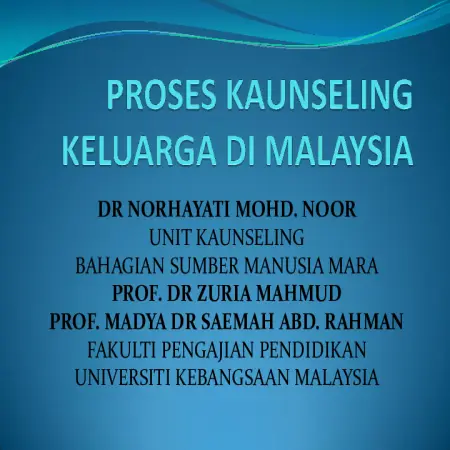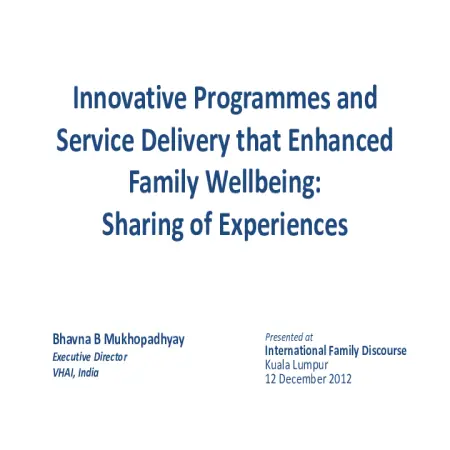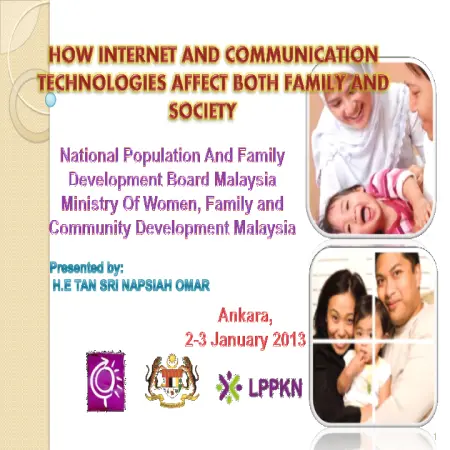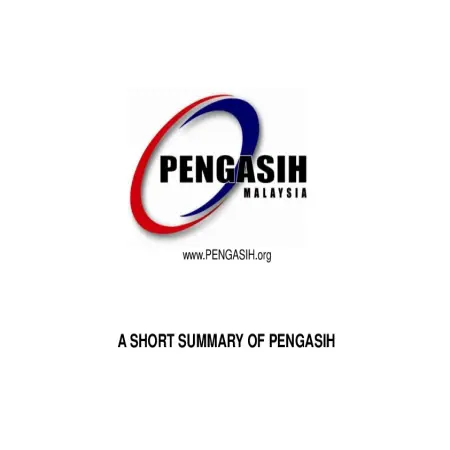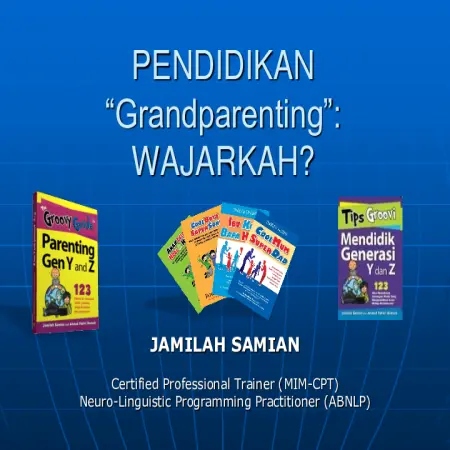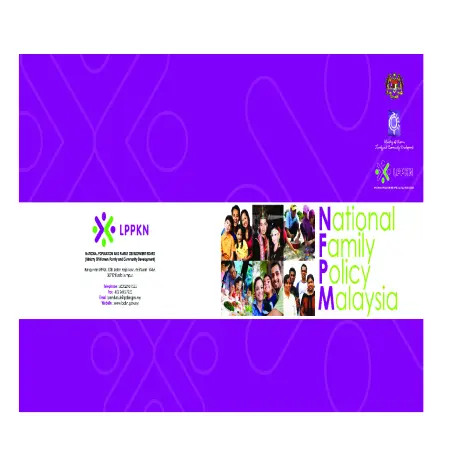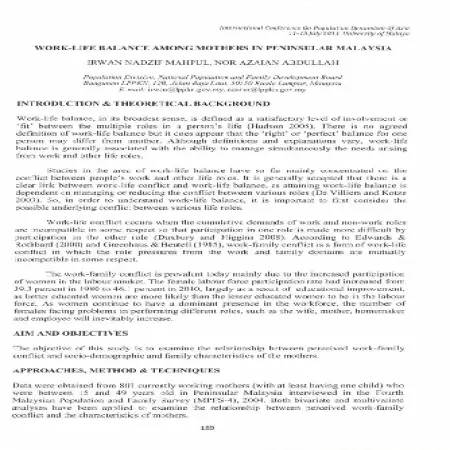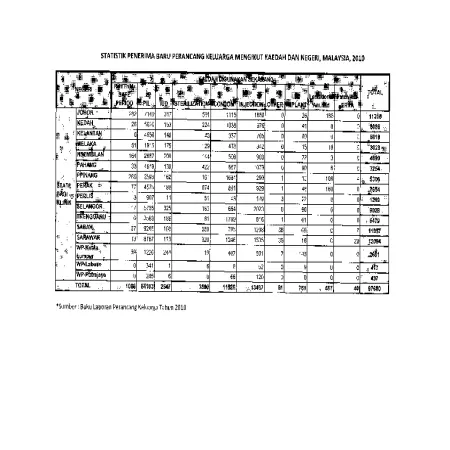TOPICS
Results for Topics : "Family"
|
|
Proses kaunseling keluarga di Malaysia
Item Type: Conference or Workshop Item
Editor:
Year: 00/00/2012
Abstract: Family counseling is one of the interventions in family services for built a healthy family in Malaysia. This is a qualitative case study of a variety of 'settings' aims to explore the phenomenon of family counseling process conducted by practitioners in Malaysia with an in-depth interview technique, observation and document analysis. Study participants in the study were 12 family counseling practitioners from three counseling service centers. This study has five research questions namely to (i) identify the type of cases handled, number of cases and causes of problems in the family counseling process (ii) identify the initial relationship in the family counseling process (iii) explore the family counseling process (iv) identify approaches and skills used in family counseling and (v) explore the impetus and challenges of the family counseling process among family counseling practitioners in various settings in Malaysia. Cross -case analysis method based on interviews, observations and document analysis on family counseling practitioners was implemented using Nvivo 8 software. In this study, 190 themes and sub -themes were produced from 12 study participants. The results show that there are some similarities and differences between the family counseling process in Malaysia and the process framework in Western countries. These similarities and differences occur at all levels of the counseling process, skills, use of techniques, application of theory, and challenges in practice. The results of the study also show that the family counseling process among practitioners in Malaysia is tied to the education and training received by the practitioner, the context of religion, culture, values and SES of the family and community in Malaysia. Therefore, this study contributes to the provision of family counseling process that is very necessary in strengthening the family institution and can be an intervention in building a generation of excellent Malaysian society.
|
|
|
|
|
|
Innovative programmes and service delivery that enhanced family wellbeing: sharing of experiences
Item Type: Conference or Workshop Item
Editor:
Year: 00/00/2012
Abstract: While India has been on the path of economic progress over the last decade, our health system is at crossroads today. Even though Government initiatives in public health have recorded some noteworthy successes over time, the Indian health system is ranked 118 among 191 WHO member countries on overall health performance. There are wide variations in health indicators across the States (11 states with a population of 60%, still have a TFR of over 3 whereas 6 states with 11.4% of the population have already achieved replacement levels of fertility of 2.1. Some of the flagship programmes to improve the availability of and access to quality health care, especially for those residing in rural areas, the poor, women, and children, have been National Rural Health Mission (NRHM) and Mahatama Gandhi National Rural Employment Guarantee Act (MGNREGA). This paper discusses the sharing of information on the health system in India.
|
|
|
|
|
|
How internet and communication technologies affect both family and society
Item Type: Conference or Workshop Item
Editor:
Year: 00/00/2012
Abstract: This slide presentation shares about 65.1% Malaysians using the internet more than 9 hours. The population of internet users is 17.5 million out of a total of 28.6 million. Broadband penetration is 65% of the population in 2012. The positive impact on family is to enhance communication, strengthens relationships, enable parents to work from home and monitoring of children. Meanwhile, the negative impact on family are such as internet addiction, weakening family relationship, “narcissistic” behavior, excessive self-admiration especially among teens. Playing on the computer in the long term can lead to addiction, ill tempered nature and becoming antisocial. Children also can become more aggressive due to expose to violent games.
|
|
|
|
|
|
A short summary of Pengasih
Item Type: Conference or Workshop Item
Editor:
Year: 00/00/2012
Abstract: This paper discuss about a short story summary of PENGASIH. Persatuan PENGASIH Malaysia is registered as an NGO in 1991. Our main activities for the past 22 years are Rumah PENGASIH which is a rehab and treatment centre for recovering addicts using the Peer-Pressure Community System. Seruan Kasih refers a continuous drug intervention and prevention campaign to students, youth and communities. Sidang Kasih is a monthly Family Support Group for family members of recovering users. Teduhan Kasih refers to half-way houses for recovering users to re-enter their mainstream societies by way of work, schooling and training. Finally, Khidmat Kasih is an economic projects towards self-sustenance for PENGASIH and members of PENGASIH.
|
|
|
|
|
|
Pengkelasan keberkesanan perancang keluarga menggunakan pepohon keputusan
Item Type: Conference or Workshop Item
Editor:
Year: 00/00/2012
Abstract: Awareness of the importance of family planning practices for a family institution in Malaysia began around the 1960s. In order to plan family size it is important to determine the appropriate and effective method of family planning. Therefore, this study was conducted to develop a best classification model and identify the factors of effectiveness of such methods and also for women who do not use any family planning method, factors that influence the effectiveness of non-use of methods are also identified. Classification techniques in data mining were used to obtain patterns of effectiveness of the family planning methods used. The classification techniques used are result trees J48, ID3, Random Tree, REPTree and Bayes classifier Naive Bayes. Secondary data from the fourth set of the Malaysian Population and Family Survey (MPFS) obtained from the National Population and Family Development Board (LPPKN) were used in this study. To obtain the best classification model, 10-fold cross validation method, Weka and Mynda applications were used. The test results found that the J48 result tree was selected as the best classification model because this model provides the highest accuracy values for both data sets of 87.83% and 80.42% compared to other techniques. The study has produced a decision tree that can generate a set of tips to identify the effectiveness of family planning methods used and a set of tips to identify the effectiveness of those who do not use family planning methods. In conclusion, this study does not cover women who are using family planning methods and it is hoped that future studies will cover the effectiveness of the method for women who are using family planning methods and make pattern comparisons based on MPFS 1, MPFS 2, MPFS 3 and MPFS 4 data sets.
|
|
|
|
|
|
The prevalence of work-family conflict among mothers in Peninsular Malaysia
Item Type: Article
Editor:
Year: 00/11/2011
Abstract: Achieving work-family balance is dependent on managing the conflict between work and family roles. This study focuses on the prevalence of work-family conflict among mothers in Peninsular Malaysia. The objective of this study is to examine the relationship between perceived work-family conflict and socio-demographic and family characteristics of the mothers. Data were obtained from 801 currently working mothers (with at least having one child) who were between 15 and 49 years old in Peninsular Malaysia interviewed in the Fourth Malaysian Population and Family Survey (MPFS-4), 2004. The result of this study showed that ethnicity, age and employment are the main factors contributing to the prevalence of work-family conflict. However, there is no significant relationship between the prevalence of conflict and the studied family characteristics, namely, number of children, childcare arrangement and presence of children aged 7 to 24 years.
|
|
|
|
|
|
National Family Policy
Item Type: Act & Policy
Editor:
Year: 00/03/2011
Abstract: Malaysia is one of the few countries that has an explicit policy on family. The National Family Policy (NFP) was launched on 19 March 2011. It advocates the concept of family wellbeing based on family values such as caring, honesty, justice and equity regardless of status, gender and age. At the macro level, the policy will be the catalyst to urge all stakeholders to take into account the family perspective in all their planning, strategy formulation or development efforts, either through their commitment, formulation or review of policies and laws that are not family friendly to ensure that programmes, services and family friendly facilities are accessible.
|
|
|
|
|
|
Work-life balance among mothers in Peninsular Malaysia
Item Type: Book Section
Editor:
Year: 01/01/2011
Abstract: Achieving work-family balance is dependent on managing the conflict between work and family roles. This study focuses on the prevalence of work-family conflict among mothers in Peninsular Malaysia. The objective of this study is to examine the relationship between perceived work-family conflict and socio-demographic and family characteristics of the mothers.
|
|
|
|





